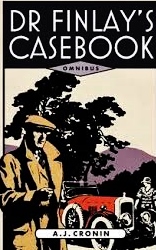
Dr Finlay’s Casebook, a hugely popular television series in the 1960s and ’70s, had something of a reputation for being a bit twee with a good dollop of Scottish sentimentality rolled in; human interest stories of everyday people and a heroic doctor who tried to turn their lives around; except, of course, he couldn’t.
The stories were set in a fictional Tannochbrae somewhere in Scotland during the 1930s – the hungry thirties of the Great Depression when vast swathes of Britain led a hand-to-mouth existence with very little help coming from the state. Those most badly affected were dependent on charities, local health schemes, friends and their own families.
Tannochbrae was not as obviously impoverished as other places – this was no filthy, ugly, disease-ridden inner city but impoverished it was – bonnie but disease-ridden this rural village shared with its urban neighbours hunger, poverty and ill-health. The taciturn Dr Finlay who assisted the inscrutable Dr Cameron was surely the author A J Cronin himself for there is much in the writer that appears in Finlay’s character.
Underlying the stories is a strong sense of decency – of humanity, a benevolent outlook by Tannochbrae’s doctors who breathed air that was fresher and purer than many of their patients yet were driven by their sense of duty and consideration to ease their lives, as far as they were able; behaviour not always typical of their profession with its share of uncaring snobs, over-ambitious dilettantes and ignorant oafs, if Cronin’s characterisations are anything to go by.
Far from being happy-ever-after frippery the Tannochbrae stories exposed the bleak reality of life for so many before the advent of the National Health Service. Poverty not only produced despair but starvation, susceptibility to illness and premature and avoidable death. Poverty in a world where money is king and the king-makers include respected members of parliament often reluctant to change a system built on inequality because inequality benefits those at the top which often included them. Money didn’t guarantee you didn’t get sick but it did buy medicine and treatment and it did buy better housing, clean running water, a warm fire and with those came better odds, an improved chance, to avoid contagions, work-related accidents and to survive serious illness.

A J Cronin
Cronin dealt with much of the awkward social divisions that consigned the working classes to unbelievable misery for as a young Scots doctor he found himself thrown into working class communities where life was a daily grind that offered spartan comforts.
I re-discovered Cronin when clearing out the house of a deceased relative and picked up a copy of The Stars Look Down that had belonged to my late uncle, also a doctor. I was captivated by the book, a tale of miners in northeast England who were victims of political opportunism and betrayal. It is, in my opinion, Cronin’s finest work – hugely impressive and its description of a mining accident is truly memorable. The Stars Look Down should be read by everyone in this country, and should be on school reading lists for not only is it well-written it is our social history in easy bites. But it is not this book that’s being spoken about at the moment. The Citadel has been resurrected for its influence in the debate that led to the creation of the National Health Service in 1948.
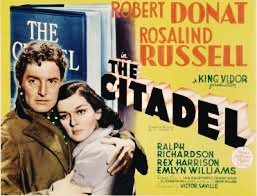
Set in Wales and London during the 1920s and 1930s The Citadel draws from Cronin’s own experience as a doctor in both places. The young Cronin had his sights on a Harley Street practice and he did get there but by a circuitous route that opened his eyes to the dreadful impact on the poor of Britain’s ramshackle medical services – a rag-bag of medical chance – postcode lottery before postcodes.
Corruption features a great deal in Cronin’s works – the medical officer of health who doesn’t care a fig for the sick, the conscientious doctor driven to drink by a system that overburdens him as an individual, the ambitious practitioner blithely striding forward in his career at the expense of his patients, manipulative politicians on the make – they were Cronin’s colleagues and acquaintances and a rich source of characters for his writing.
Hatter’s Castle was Cronin’s first book but it was The Citadel published in 1937 that attracted huge attention – and fame and riches for its author when it was made into a Hollywood film with four Oscar nominations in 1938. The Citadel was credited with shifting opinion towards a universal health care system – a national health service. In it a young doctor, much like Cronin, struggled to make a difference to the lives of his Welsh patients in a small mining community. Cronin worked in the Welsh mining town of Tredegar and was employed at the its hospital which was financed locally through contributions paid into Tredegar Medical Aid Society (MAS) in return for medical treatment for contributors and their families. Tredegar MAS was an amalgamation of smaller benevolent or friendly societies. Around Britain in the 19th and 20th centuries there were many similar organisations that helped their working class members – providing a doctor service and sick pay but as they were linked to particular industries and their members largely men women and children were not covered. The Tredegar MAS broadened the range of benefits to include payouts for work accidents, sickness, unemployment and death expenses. Doctors were attached to a society by a ballot of members and in turn he could employ an assistant, the role of Dr Manson in Cronin’s The Citadel.

Welsh mining village
Local friendly societies were run by powerful individuals so open to corruption. Medicine was then near wholly privatised with everything having its price as it is in private practice today: consultations, examinations, operations, x-rays, scans, every pill and plaster. Young doctors cut their teeth working as assistants to more senior colleagues who sometimes creamed off a sizeable portion of the little income they earned. Such corrupt practices were exposed in The Citadel. By shining a spotlight on the paucity of health care in Britain Cronin was able to educate and influence people, to alter attitudes towards the ramshackle health (don’t) care system.
“I have written in The Citadel all I feel about the medical profession, its injustices, its hide-bound unscientific stubbornness, its humbug … The horrors and iniquities detailed in the story I have personally witnessed. This is not an attack against individuals, but against a system”
Cronin’s hero, Dr Manson – a Scot like himself – is shocked at what he finds on his arrival firstly at Drineffy, a little Welsh coal mining town. Underpaid and undervalued, Manson struggles to cope so early into his career as the only fit and sober doctor in the town but he also struggles against penury for most of his salary is retained by the senior society doctor. Driven to resign Manson finds himself in a bigger town where there is greater scope to practise and undertake scientific research into the lung disease that he has become all too familiar with since arriving in Wales for it was a major killer in the coal mining communities. Again Cronin draws on his own experience with Manson eventually building his reputation and moving into private practice in search of wealthy patients easily conned to shell out for useless bottles of ‘tonics.’ This was not meant to be a book review so I won’t reveal more of the story for the real value is in its description of an alternative system of health care that stood out amidst all the various styles practised around the UK.
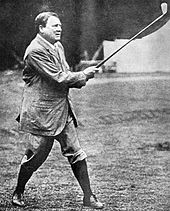
Lord Northcliffe at work
But let us back-pedal a little. A National Insurance Act came into being in 1912, despite the British press loudly opposing it. Most of Britain’s major newspapers were then owned and controlled by Tory press baron Lord Northcliffe whose empire Associated Newspapers Ltd produced such titles as the Daily Mail, The Times and The Observer. They all used their columns to churn out propaganda against the scheme. Northcliffe had no sympathy for working class people and was hostile to old age pensions while at the same time he demanded, through his newspapers, increased government spending on armaments. There is little doubt he was an unpleasant and violent bully and not untypical of his class. He could not stomach a scheme to help protect the most vulnerable which involved employer and government contributions along with workers’ own in order to provide such basic benefits as sick pay, free treatment for tuberculosis, care by a panel doctor and maternity benefits. Despite fierce opposition from Northcliffe and other loud voices the Act became law but it was far from perfect. It was fine in urban areas and much of Britain but Scotland’s topography is markedly different from the south in that it is far more widespread (don’t go by weather maps on television) which meant the Act was unworkable across half of Scotland’s land mass and its crofting communities.
An answer here in Scotland came in 1913 with the establishment of a centralised state-run health service which operated across the Highlands and Islands as The Highlands and Islands Medical Service (HIMS) and it continued until superseded by the UK-wide National Health Service in the summer of 1948. It was the Dewar Report of 1912 which revealed major problems in Scotland’s rural areas with the National Insurance Act so a bespoke alternative scheme was put in place whereby doctors, nurses and midwives were subsidised to live and work in sparsely populated areas with few opportunities to rake in substantial earnings. A medical laboratory was set up in Inverness (which Cronin would have approved of) and an air ambulance eventually provided. This bold endeavour became a model for similar schemes in rural Canada and the USA and in the 1940s influenced the design of the NHS.
The Highlands and Islands Medical Service was not identical to the later NHS for it was not free to patients but it did establish a body that attempted universality of cover and was a vast improvement in what had gone before.
Britain in the 1930s was riven by extremes of wealth and degrees of poverty unimaginable to us today. There was virtually no state help and having nothing then meant nothing to buy food, keep a roof over a head, buy clothing or keep healthy. Living conditions in towns especially were quite atrocious. Cronin’s candid writing about health inequalities helped raise popular awareness and highlighted a system that put patients at its centre. Such was the appetite for his books it was clear public opinion demanded change to lift Britain’s millions of families struggling against the odds out of perpetual misery and despair while others worked the system – political, social, industrial and medical – to amass riches way beyond most people’s comprehension. Then came the Second World War.
During the war a study into the provision of social care in the UK resulted in the Beveridge Report which identified five areas requiring attention by government: squalor, ignorance, want, idleness and disease. Discussions between the government and the medical professions including the Tredegar Society and the Highlands and Islands Medical Service led to proposals for fundamental reforms in health and social care. At the end of the war there was such a groundswell of opinion for change that the Labour Party was swept into government on the promise it would set up a National Health Service. Central to this was Aneurin Bevan, one-time a health board colleague of Cronin’s in Tredegar. It should be said that Cronin did not support the NHS when it first emerged and his scepticism and opposition was shared by a fair number of the medical establishment. Reading his biography it’s fair to say he comes across as something of a snob, tediously religious in a judgemental way, attached to the very hierarchies that maintain inequality and he was vehemently hostile to abortion (and, yes, I recognise the time he was writing but there were many doctors in Scotland and elsewhere, his contemporaries, who recognised the need for offering abortion in particular circumstances [and in Scotland medical abortion was not the criminal act it was in England and Wales] .) I know from that same uncle that rekindled my interest in Cronin’s works just how split over the prospect of an NHS were doctors – many regarding it as socialism, an anathema to the mostly ultra-conservative medical profession. Cronin shared this view. And, contrary to what you might expect, the NHS was launched not with a bang but a whimper, certainly as far as newspapers I’ve looked at were concerned. The main story of the 5 July 1948 was Britain’s worst air crash or concern over the Russians.
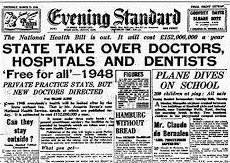
Cronin was born in 1896 at Cardross in Dunbartonshire and as a schoolboy exhibited a talent for writing at Dumbarton Academy. Torn between a career in the church or medicine he said he chose the lesser of two evils, so medicine it was. He won a Carnegie scholarship and graduated from Glasgow University in 1919 and from there went on to obtain further qualifications. He practised medicine in Scotland, England and Wales where he was confronted by life in the raw in a dirty, alien village smothered in coal dust and scarred by distress. He was made Medical Inspector of Mines for Great Britain in 1924 which provided scope for his research into lung diseases brought on by breathing in industrial dust, such as coal dust, and rife among miners. The link seems obvious to us today but it was not when Cronin studied it. Once he found success as a doctor the work seemed to bore him; prescribing medicines and dispensing advice to his then wealthy patients in Harley Street and Notting Hill in London and he abandoned his medical practice for life back in Scotland to try his hand at writing.
Cronin’s itchy feet saw him move to more places around the world than there is room for here. He became a major name in the world of celebrity and wealthy as Croesus and I suppose it is an irony that he made his money from his gritty depictions of the powerless and exploited during some of Britain’s bleakest and most impoverished times. While not great literary works Cronin’s easy style of writing and his eye for detail makes reading his books a pleasure rarely a chore.
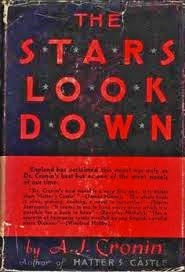
I know one or two people, all male, who never – that’s never ever- read books. Literature is not only an enjoyable (mostly) pastime it is a vehicle to encounter experiences we would otherwise never know about. It offers us opportunities to confront issues in a palatable way which might alter our preconceptions. I hope some of you will pick up a Cronin novel – I recommend The Stars Look Down and be prepared to have your eyes opened to a world that is hard to imagine today. In the meantime when you next visit the doctor or are admitted to hospital spare a thought for how the NHS came about and worry that its days might be numbered in which case we might all be closer than we’d like to experiencing the pre-NHS world of Cronin’s sick and vulnerable patients.



